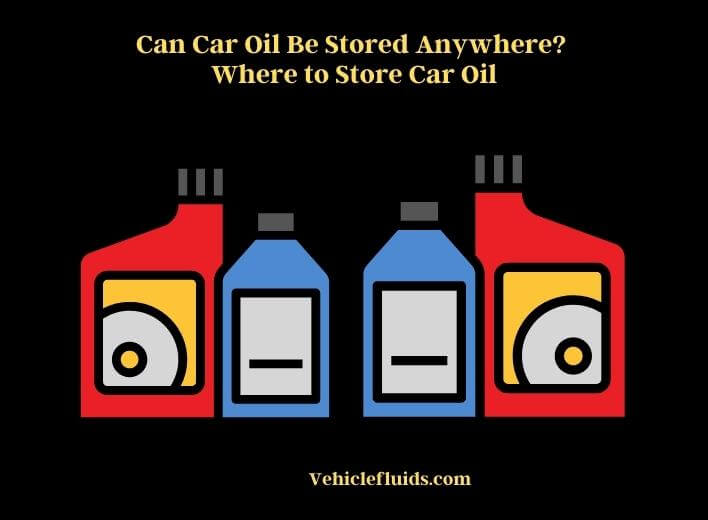Maintaining your car’s engine is essential for its performance and longevity, and one of the most important aspects of engine maintenance is using the right oil and changing it regularly. Many car owners need to pay more attention to the importance of proper oil storage, assuming it can be stored anywhere in their garage. The truth is that storing car oil incorrectly can lead to degradation, contamination, or even combustion, which can harm both the engine and the environment.

The answer is no if you’re wondering whether car oil can be stored anywhere. You should follow specific guidelines to ensure your car oil remains in top condition. In this article, we’ll explore the dos and don’ts of oil storage and provide you with all the information you need to store your oil correctly.
We’ll cover the ideal location for storing your car oil and the don’ts of oil storage, such as avoiding storing oil near flames or heat sources and not mixing different types of oil. This information lets you store your car oil properly and ensure your engine runs smoothly for years.
Can Car Oil Be Stored Anywhere?
No, car oil cannot be stored anywhere. Proper storage is crucial for maintaining the quality of car oil and ensuring it functions properly when used in a car. Storing car oil improperly can lead to its degradation, reducing its effectiveness and possibly causing damage to a car’s engine. It is essential to understand where and how to store car oil correctly.

The Importance of Proper Oil Storage
Proper oil storage is essential for several reasons. First and foremost, storing oil correctly ensures that it remains in good condition and does not degrade or become contaminated. Oil spoiled or contaminated can lead to significant engine problems, reduced engine life, and costly repairs.
Secondly, storing oil correctly helps to prevent environmental contamination. Improperly stored oil can leak or spill, polluting soil and groundwater. Oil can also be toxic to wildlife, causing harm or even death if ingested.
Thirdly, storing oil correctly helps to prevent accidents and injuries. Oil is flammable and can ignite if exposed to heat or flames. Storing oil near heat sources or flames can lead to fires or explosions, endangering you, your family, and your property.
Finally, storing oil correctly is cost-effective. When oil is stored correctly, it can last longer, reducing the need for frequent oil changes and saving you money. It also ensures that your engine runs efficiently, reducing the risk of costly repairs.
Oil storage is crucial for engine performance, environmental protection, safety, and cost savings. Take the time to store your oil correctly, and you’ll protect your engine, the environment, and yourself.
Where to Store Car Oil?
When storing car oil, choosing the right location is essential to ensure that the oil remains in good condition and does not become contaminated.
Cool and Dry Place:
The best place to store car oil is in a cool, and dry location. Heat and moisture can cause oil to break down, leading to contamination and degradation. Ideally, the temperature should be between 40°F to 85°F.
Away from Heat Sources:
Storing car oil away from heat sources such as furnaces, water heaters, and direct sunlight is vital. Heat can cause oil to break down and become less effective.
Well-Ventilated Area:
Proper ventilation is essential when storing car oil. Poor ventilation can cause oil to oxidize, leading to the formation of sludge and other contaminants.
Labeled and Airtight Container:
It’s crucial to store car oil in airtight, labeled containers to prevent moisture and contaminants from entering the oil. Labeling the containers also helps prevent confusion and ensures you use the right oil for your car.
Child and Pet-Proof Area:
Storing car oil in a child and pet-proof area is critical to preventing accidents and injuries. Children and pets may accidentally knock over containers, causing spills or even ingesting the oil.
Storing car oil in a cool, dry, and well-ventilated area away from heat sources and children and pets is essential to maintaining its quality and protecting your engine. Proper storage can also save you money by extending the life of your oil and reducing the need for frequent oil changes.
The Dos of Oil Storage
Proper oil storage is essential for maintaining the quality and effectiveness of your car’s oil. Here are some dos of oil storage that can help ensure your oil remains in good condition:
Store Oil in Its Original Container:
The original container in which the oil was purchased is specifically designed for storing oil and helps to prevent contamination. Therefore, it’s recommended to store oil in its original container.
Label Containers:
Labeling containers of oil is crucial to avoid confusion and ensure you’re using the right oil for your car. Labeling also helps you keep track of the date of purchase and use-by date of the oil.
Store Oil in a Cool, and Dry Place:
Heat and moisture can cause oil to break down and become less effective. Therefore, storing oil in a cool, dry place is vital. The ideal temperature for oil storage is between 40°F and 85°F.
Keep Containers Clean:
Always keep oil containers clean and free from dust and debris. This helps to prevent contamination of the oil.
Keep Containers Sealed:
It’s essential to keep oil containers tightly sealed when not in use. This helps to prevent the oil from oxidizing and becoming less effective.
The Don’ts of Oil Storage
When it comes to storing car oil, there are also several don’ts to keep in mind. Here are some things you should avoid:
Don’t Store Oil Near Heat Sources:
Heat can cause oil to break down and become less effective. Therefore, avoiding storing oil near heat sources like furnaces, heaters, or direct sunlight is crucial.
Don’t Store Oil in Humid or Damp Areas:
Moisture can cause oil to degrade and become less effective. Avoid storing oil in humid or damp areas like basements, garages, or outside storage sheds.
Don’t Mix Different Types of Oil:
Mixing different types of oil can cause chemical reactions that can damage your engine. Always use the same type of oil that your car’s manufacturer recommends.
Don’t Store Oil for Too Long:
Oil can break down over time, even when stored correctly. Therefore, it’s essential to check the expiration date on the oil container and use the oil before it expires.
Don’t Store Oil Near Food or Drink:
To avoid contamination, oil containers should be kept away from food or drink items.
Benefits of Proper Car Oil Storage
Proper car oil storage is essential for maintaining the quality and effectiveness of your engine oil.
Helps Maintain Engine Performance:
Storing oil in a cool, dry place away from heat and moisture can help preserve its quality and effectiveness. As a result, your engine can perform at its best and avoid premature wear and tear.
Saves Money:
Proper oil storage can help extend the lifespan of your oil, reducing the need for frequent oil changes. This can save you money on oil changes and help you avoid expensive engine repairs in the long run.
Protects the Environment:
Used oil is considered hazardous waste and must be disposed of properly. By storing oil correctly, you can help prevent oil from leaking or spilling and avoid contaminating the environment.
Helps Ensure Safety:
Storing oil in a safe and secure location can help prevent accidents and injuries. Oil can be slippery, and spilled oil can be a fire hazard. Proper storage can help reduce the risk of accidents and protect your safety.
Bottom Line
Car oil is a vital component for proper functioning of your engine, and it is essential to store it correctly to maintain its quality and protect your engine. Storing car oil in the wrong place or using contaminated oil can lead to significant engine problems, so it’s crucial to follow the dos and don’ts of oil storage.
Remember to store your car oil in a cool, dry, well-ventilated area away from flames, heat sources, and children and pets. Label your containers correctly, and use airtight containers to prevent moisture and contaminants from entering the oil. Also, avoid mixing different types of oil, as this can lead to undesirable chemical reactions. Take the time to store your oil correctly, and you’ll save yourself money, time, and headaches in the long run.
Relevant Resources:
